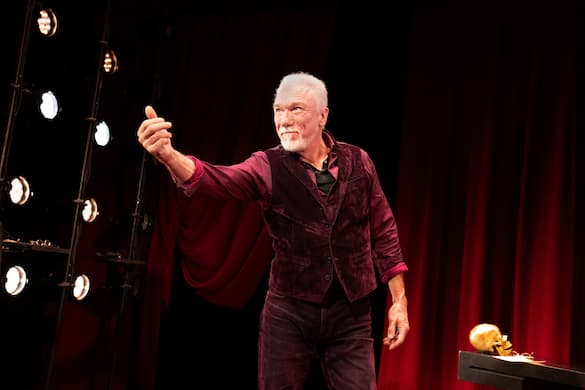How Shakespeare Invented the Villains Actor Patrick Page Plays Today
Part of what makes ‘All the Devils Are Here’ such a valuable exercise is that it demonstrates how a dead, white Englishman both grappled with the assumptions and biases of his less enlightened time and ultimately transcended them.

“Do you believe in evil?” the veteran stage actor Patrick Page asked an audience last week at a preview performance of his new one-man, one-act show, “All the Devils Are Here.” It was a timely question, given the horrors that had just unfolded in the Middle East, but Mr. Page did not have current events in mind.
“Devils,” which Mr. Page created himself, is subtitled, “How Shakespeare Invented the Villain.” If that label suggests an undergraduate course more than a play, fear not: Under Simon Godwin’s taut, witty direction, this 85-minute production proves as thrillingly theatrical, in its intimate way, as it is thought-provoking.
Mr. Page is no stranger to the Bard, or to villains generally; his many roles on Broadway have ranged from The Inquisitor in “Saint Joan” and Comte de Guiche in “Cyrano de Bergerac” to Scar in “The Lion King” and the Green Goblin in “Spider-Man: Turn Off the Dark.” An imposing presence with a distinctly dusky basso voice, the actor opens this homage to darkness with the words of Lady Macbeth, whose husband he will later sum up thusly: “Macbeth’s tragedy is not that he is evil — his tragedy is that he chooses evil.”
“Devils” is packed with such accessible insights, as Mr. Page takes us through Shakespeare’s evolution as a man and an artist, segueing from biographical information and commentary to excerpts showcasing some of the plays’ most iconic heavies. “They’re not all characters I would play — some of them have abilities and ethnicities different than my own,” Mr. Page notes early on.
Part of what makes “Devils” such a valuable exercise, in fact, is that it demonstrates how a dead, white, Englishman both grappled with the assumptions and biases of his less enlightened time and ultimately transcended them. One powerful sequence contrasts the title character of Christopher Marlowe’s “The Jew of Malta” with Shylock in “The Merchant of Venice,” using parallel passages from both works.
Pointing out that “the Elizabethan audience was rabidly antisemitic,” Mr. Page observes, “Shakespeare forces us to ask: If we had been treated as Shylock was treated, might we find the same thirst for vengeance in ourselves?” Other infamous bad guys are also shown to be more complex, locked in struggles with human flaws such as ambition (Malvolio in “Twelfth Night”), cowardice (Claudius in “Hamlet”), and self-loathing (the title character in “Richard III”).
Tackling the most egregious of Shakespeare’s villains, Mr. Page recalls devoting a year to exploring Iago’s psychology when he was cast in the role in a production of “Othello.” In a segment that is, like others in “Devils,” at once chilling and surprisingly funny, the actor recalls reading Dr. Martha Stout’s “The Sociopath Next Door,” noting her thesis that one in 25 people could be diagnosed as such. “That means in today’s audience there are likely four of you out there, behaving quite normally,” Mr. Page quips.
“Devils” ends, fittingly enough, with an exorcism of sorts — not of diabolical forces, but of justifiable anger. With a characteristically powerful reading of an exchange between the wrongly deposed duke and sorcerer Prospero and the spirit Ariel in “The Tempest,” Mr. Page reinforces his own show’s driving theses: that most of us are too complicated to be written off as any one thing, let alone evil, and that Shakespeare’s ability to identify and illustrate this truth, with enduring beauty, is central to his legacy.
Anyone ambivalent about that legacy — or resistant to our most famous playwright’s appeal for other reasons, like language — is likely to walk away from “Devils” a convert. Go, and bring a friend, or, better yet, an older child or teenager. It could help them approach those undergrad classes with a lot more enthusiasm.
________
Shakespeare’s nationality has been updated from the bulldog edition.

